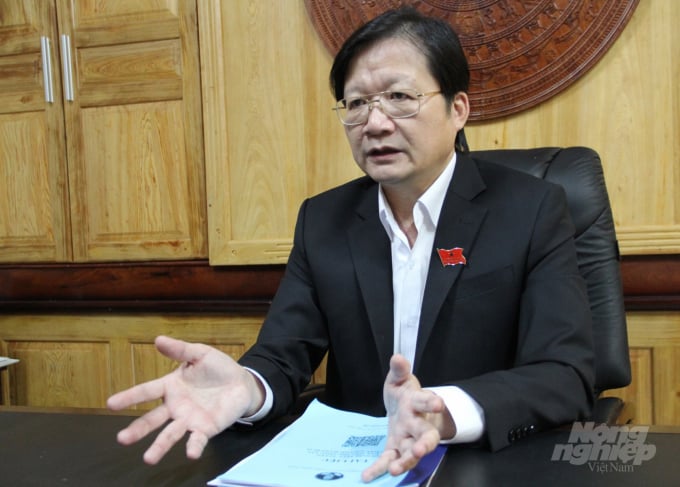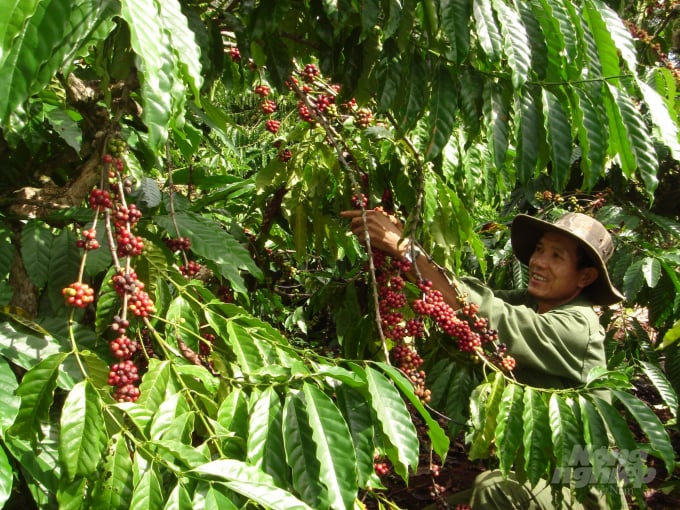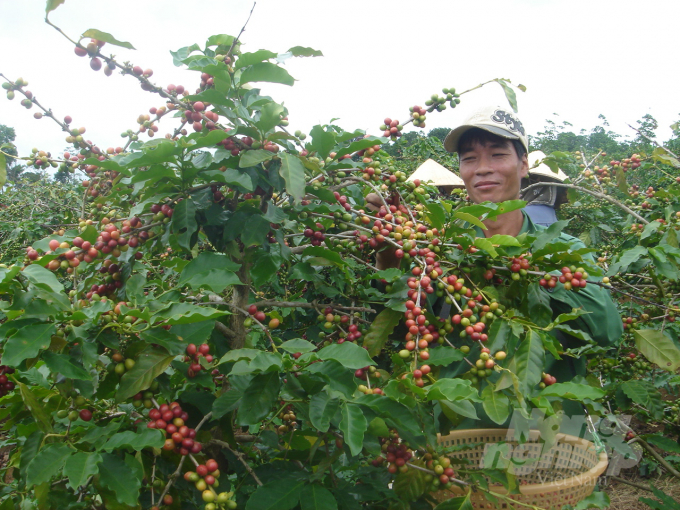June 16, 2025 | 01:08 GMT +7
June 16, 2025 | 01:08 GMT +7
Hotline: 0913.378.918
June 16, 2025 | 01:08 GMT +7
Hotline: 0913.378.918

Mr. Nguyen Hoai Duong, Director of the Department of Agriculture and Rural Development of Dak Lak.
“Labor shortage will be a big challenge,” says Mr Nguyen Hoai Duong - Director of the Department of Agriculture and Rural Development (DARD) of Dak Lak province.
“Difficulties after difficulties,” he continues as saying that many main fruits of Dak Lak are consumed slowly because of transportation conditions applied in provinces and cities. The affected fruits are pineapple, mango, durian, avocado, etc.
Other industrial plants like coffee, pepper see a more positive signal as prices are higher to the same period in the last 2 - 3 years.
"Dak Lak is the capital of coffee, currently has 209,900 hectares, accounting for 33% of the total area nationwide, with an output of 557,700 tons. The province has about 185,000 coffee producing households, attracting about 300,000 direct workers and about 200,000 indirect workers," says Mr. Nguyen Hoai Duong.
The coffee harvest season in Dak Lak as well as the Central Highlands provinces is coming. In each coffee harvest season, Dak Lak and in any other provinces in Central Highlands need a large amount of laborers, usually from the outside provinces to serve the harvest. This year, due to the impact of the Covid-19 pandemic, the problem of labor for coffee harvesting will be extremely difficult.

Dak Lak is the capital of coffee, currently has 209,900 hectares, accounting for 33% of the total area nationwide, with an output of 557,700 tons.
The coffee harvest season in Central Highlands is from October to December. At the time of fully ripe, on average, one hectare of coffee needs 10 - 15 laborers to harvest in 10 - 15 days. If harvested late, the ripe coffee beans will fall, causing loss, and affecting the quality.
As the harvest concentrates in a short time, coffee growers usually have to hire a fairly large force of workers from other provinces, especially the central provinces. Until recently, Covid-19 leads to the social distancing, causing many difficulties in travelling, results in a sharp shortage of workforce.
To solve this problem, the agricultural sector in Dak Lak has proposed many solutions. Accordingly, the DARD of the provine has advised the Provincial People's Committee to issue the Directive on Coffee Harvesting, which directs localities to develop plans to harvest coffee in the area in the context of the Covid-19 epidemic.
Localities should focus on all resources, mobilize forces to join hands to support harvesting, transporting, processing and preserving coffee.
In case there is a shortage of workforce from outside the province, localities should take advantage of laborers in the province by exchanging jobs between them or between enterprises, follow the theme "ripe first - harvet first", while ensuring the requirements of controling and preventing Covid-19, supporting farmers to harvest coffee effectively and limit losses.
Dak Lak will create favorable conditions for workers and vehicles to harvest coffee. The province also strengthens management and supervision measures according to the requirements of epidemic prevention and control, while suggest other provinces to create favorable conditions people who have been fully vaccinated against Covid-19 to come to Dak Lak to collect coffee.

Dak Lak will create favorable conditions for workers and vehicles to harvest coffee.
“The DARD of Dak Lak makes a list of reputable purchasing units and transport units to provide people with transaction addresses, and prepares drying yards and dryers to prevent lasting rain, so not to be passive in all situations.
The DARD will also recommends the Ministry of Agriculture and Rural Development and the Ministry of Industry and Trade actively connect with domestic and foreign markets to sustain the supply chain. Besides, it is necessary to have supportive policies for people and businesses to temporarily store when the price is too low and cannot be sold," added Mr. Nguyen Hoai Duong, Director of the DARD of Dak Lak.
Translated by Khanh Linh
/2025/06/12/3721-2-202745_83.jpg)
(VAN) TH made an impression at Seoul Food 2025 with its line of natural beverages, paving the way for Vietnamese food products to enter the South Korean market.

(VAN) Soc Trang's success in rice exports stems from a strategy of developing fragrant and specialty rice cultivation areas and standardizing production toward low-emission practices.
/2025/06/11/1311-5-120811_839.jpg)
(VAN) The pig farming industry is facing the challenge of comprehensive restructuring to meet requirements for quality, safety, traceability, and market expansion both domestically and for export.

(VAN) Vietnam considers participating in ALGROALBA in order to expand agricultural production, coordinate the assessment and effective exploitation potential land.
/2025/06/05/5314-1-184727_407.jpg)
(VAN) From seemingly worthless fish scales and skin, enzymes and lactic ferments can transform by-products into peptides, opening a sustainable, effective business direction and elevating Vietnamese seafood.

(VAN) TTC AgriS and IFC signed a strategic partnership to develop a sustainable agricultural value chain, aiming to achieve the Net Zero target by 2035.

(VAN) Seafood by-products are opening a new path, combining green growth and technological innovation to enhance the industry's value.